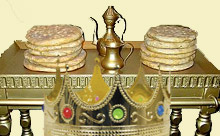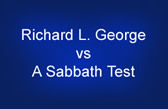

Argument XX
King David and Restaurants


I n this attempt to justify dining out on the Sabbath, Mr. George reasons that because King David ate the shewbread which was not lawful, and because the disciples picked grain on the Sabbath, and were condemned by the Pharisees, he may now go to restaurants and purchase the services of those who profane God' holy day. Although a portion of this is addressed in an earlier argument (Argument XIII), we felt it appropriate to add some additional insight to this portion of his spin. Below are his comments and our response.
Mr. George:
Matthew 12:1 , Mark 2:23, and Luke 6:1 all deal with the disciples "harvesting" and eating small quantities (individual meal portions) of fresh grain on the Sabbath. You compared it to picking a piece of fresh fruit at home. You are correct they ate their snack raw and did not pay for it, but that was not the issue. In this case, the Jews were not objecting based on some entirely man-made tradition of their own. Here they were objecting because they believed a personal "mini-harvest" to eat was just as much a "work violation" of God's Sabbath commandment as cutting and carrying in sheaves for sale. They lacked any sense of proportion. You object to someone's eating a restaurant meal, calling this part of a day of worship just as bad as the heavy full-day Sabbath-ignoring commerce Nehemiah decried. Thus, your reasoning for condemning a Sabbath meal tracks exactly that of the Jewish leaders for the same mistake, both they and you ignoring the huge disparities in motive, effort, and purpose. Instead of looking at paying token amounts of money for a meal at which God is praised as part of reverent Sabbath observance, you want to equate it with earning tens, hundreds, or thousands of dollars -- or even to sporting events -- substituted for Sabbath observance.
Nehemiah's reaction to this sin was passionate and forceful. He saw buying and selling as a clear breach of the fourth commandment. Furthermore, he made a direct link between this sin and Judah’s CAPTIVITY (Neh.13:15-21).
Our Response:
Once again Mr. George asserts that seeking out unbelievers, whose desecration of the Sabbath God abhors, is the moral equivalent of Jesus' disciples picking a handful of grain as a snack on this day. He then describes his Sabbath dining experience at a restaurant as "a meal at which God is praised as part of reverent Sabbath observance."
What Mr. George does in this phase of his argument is not only intellectually silly, but grossly self-serving and arrogant. However, despite this fact, he is brazen in offering this bit of “critical analysis.” Here is how the authors of A Sabbath Test accurately describe what Jesus' disciples did on this particular Sabbath.
It is true that Jesus’ apostles picked corn on the Sabbath (Mt.12: 1-8), but noticeably absent from this act was any attempt by Jesus or the apostles to buy it. Furthermore, at no time did they try to hire others to pick it for them and prepare it. What the disciples were doing was tantamount to plucking an apple from a tree and enjoying a piece of fruit during a Sabbath walk. This act may have offended the Pharisees but it did not offend the scriptures. To compare this to going to a restaurant on the Sabbath is like comparing it to harvesting crops on the Sabbath. It simply is not what happened. (A Sabbath Test p. 87)
The authors of A Sabbath Test are right on target with this assessment. For Mr. George to raise this story in defense of him doing business with restaurants on God’s Sabbath is reprehensible and makes a mockery of scripture. What he has done with his representation of the Biblical record is an attempt to manipulate a great lesson about mercy and twist it into a license to profane what God has called HOLY! By the way, while Mr. George calls what he does during his Sabbath dining, "worship," God calls it "profaning His name before the heathen."
Mr. George continued:
Christ described Himself as "Lord of the Sabbath" in Matt 12:8, Mark 2:28; and Luke 6:5. You mentioned this title in passing but did not talk about why He claimed it. All of the context shows His claiming this title and authority was His reaction to overly-restrictive opinions applying the Sabbath law. What David did was blasphemous by the letter of the law, but Jesus brushed off even that as reasonable and necessary. He said the Jews were "condemning the guiltless" by their narrow, negative approach to the Sabbath law.
Our Response:
For Mr. George to liken David seeking out God's priests and appealing to them for food, to him (Mr. George) seeking out unbelievers who are trampling all over God's Sabbath and paying them for the fruit of this sacrilege, is reprehensible. Imagine if King David's approach toward eating the shewbread was the same as Richard George's toward dining out on the Sabbath. How would Jesus have responded if David turned this one-time event into a regular tradition of "worship"?
Mr. George continued:
Notice that important point: God's own perfect law, mishandled, becomes an inexcusable burden. Jesus's approach is to view and obey the rules in a relaxed (not compromised) way that makes sense. This is not "watering down;" it is applying the original intent of the Creator Himself! You may and should do what makes sense under the circumstances as you seek to worship God.
Our Response:
It is easy to call obedience to God's law "burdensome." The Protestant world does it all the time. Our question for Mr. George is this: Are the following directives from God Almighty, "burdensome"?
1. Don’t work (Ex. 20: 8, Dt. 5:13-4))
2. Don’t compel servants to labor on your behalf (Ex. 20:10, Dt. 5:14-5)
3. Don’t compel strangers to labor on your behalf. (Ex. 20:10, Dt. 5:14-5)
4. Don’t compel your livestock to labor (Dt. 5:14)
5. Don’t compel your family to labor (Ex. 20:10, Dt. 5:14-5)
6. Don’t prepare meals (Ex. 16:23-5)
7. Don’t go outside your place (Ex. 16:29)
8. Don’t gather your daily food (Ex. 16:22-3)
9. Don’t engage in business (Neh.10:31, 13:15-21)
10. Don’t do your own pleasure (Isa. 58:13)
11. Don’t speak your own words (Isa. 58:13)
12. Don’t think your own thoughts (Isa. 58:13)
It is interesting that with all of these instructions, God still exhorts His people to call His Sabbath a "delight" as well as "honorable" and "holy" (Isa. 58:13), not "burdensome".
Mr. George continued:
The issue is not small monetary exchanges, or whether you could conceivably avoid the action. The issue is whether the action contributes to better remembering the Sabbath and keeping it holy. Do you fellowship with worshipers when presented a heaven-sent opportunity to do so, or stalk off alone and fume about their choice, condemning your spirit kindred and aggrandizing yourself?
Our Response:
This is what Mr. George's words would look like if they were spoken by a leader of a Protestant church.
"The issue is not what day you keep--such things are petty. It is not whether you could conceivably avoid one festival or another. The issue is whether the action contributes to better remembering our Savior and honoring His sacrifice. Do you celebrate your faith with fellow Christians when presented a heaven-sent opportunity to do so, or do you stalk off alone and fume about their choice to keep festivals like Christmas and Easter, condemning those who love God and aggrandizing yourself?"
Mr. George, we at Blow the Trumpet get letters like this all the time but rarely from those in God's Church. Your's however, is one of those rare exceptions. Whether you believe it or not you cannot rehabilitate this SIN by wrapping it in positive Christian fellowship. The fact of the matter is that God hates what is being done in the restaurant you patronize on His Sabbath. The problem is, you don't.
Mr. George continued:
Christ honored and kept the Sabbath perfectly; yet He invoked His authority over it to prevent leaders and influencers from making it into a burden. He's never on record adding to the burden. I find that quite salient in a situation where the church and most members have all decided that eating out can add to the Sabbath-keeping experience -- and the strongest attack on this ruling I've seen to date comes from a booklet and pair of sermons which, in my considered opinion, based on prayerful Bible study, mis-characterize the facts, omit Christ's teaching and examples, may condemn innocent brethren, impose unnecessary burden, and further divide my church family. These are among the "fruits" by which I know whether to heed or disregard a teaching (Matt. 7:16, 20). Can you furnish Bible reasons not to follow the "fruits" guidelines in this case?
Our Response:
This is the same argument advanced by Joseph Tkach when people questioned the changes he was making in the church. Mr. George, this might come as surprise to you but truth has always been a line in the sand. Furthermore, it is clear to us that A Sabbath Test reflects a profound respect for the truth. On the other hand your arguments are desperation wrapped in human reasoning. We don't believe for one second you came into this debate with an open mind. Your arguments reek with bias.
By the way, your comment about the strongest attack against dining out on the Sabbath coming from a booklet and pair of sermons suggests to us that you have never visited Blow the Trumpet. We have written prolifically on this subject. Our website contains over fifty articles on this issue, including rebuttals to pro-Sabbath dining positions like yours.
A FINAL THOUGHT